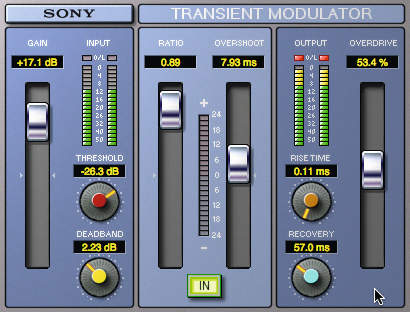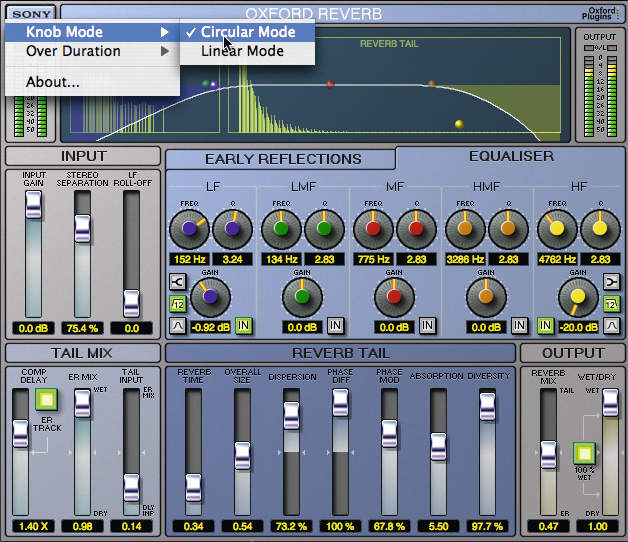MusicRadar Verdict
Yet another set of high-quality plug-ins to consider. They might cost a little more than average, but they sound better than average, too.
Pros
- +
Flexible Dynamics processor. Transient Modulator is very creative. Not too CPU-hungry. Easy and clear interfaces. Prices come down if you buy more plug-ins…
Cons
- -
They’re still quite expensive. No GML 8200 option on the EQ. Some have no presets.
MusicRadar's got your back

It's the most unusual plug-in, but Transient Modulator is no mere novelty.

Knob connoisseurs will be pleased to know that they can be set to operate in Circular or Linear mode.
If you want to gain access to the very best plug-ins, you'll need a Pro Tools HD rig, right? This might have been true a few years ago, but not any more. However, it is fair to say that there are some great plug-ins that have remained TDM-only. One such example is the Sony Oxford range. However, we can now officially stop moaning, for the plug-ins in this series are the latest to go native. What's more, they're cross-platform and cross-format: there's VST support for Windows users and AU and RTAS support for Mac. OS X VST support is also on the way. Sony Oxford have also become an independent company: Sonnox. We're told that the plan is to develop the product line further in the future.
So what's the catch? Well, almost inevitably, these plug-ins aren't cheap - the cheapest is £135 - though Sonnox's 'pick 'n' mix' pricing system means that the more you buy, the cheaper each one gets.
We're reviewing the 6 Pack Bundle, which contains the EQ, Dynamics, Inflator, Transient Modulator, Reverb and Limiter plug-ins. You can buy all of these online (as well as at the usual outlets), and you'll have to authorise them with an iLok before you use them. If you fancy giving any or all of the plug-ins a blast before you part with any cash, you can download the 15-day demos (though an iLok Key is still required to use them).
Six of the best
Of the six plug-ins currently available, EQ and Dynamics are the bread and butter ones (both are sourced from Sony's OXF-R3 console). Features of the EQ include five fully parametric bands with separate high- and low-pass filters, A/B buttons, four EQ styles and a full frequency display. It looks and sounds impressive, with the key to its success lying in the four EQ styles that it's modelled it on. These range from early SSL to classic Neve and beyond.
In use, each style behaves very differently, meaning that the EQ has four distinct 'sounds'. Combine these with its precision (accurate values can be typed in if you want) and those filters, and you begin to wonder whether you'll ever need another EQ plug-in at all. It's just a shame their GML 8200 emulation option isn't included (that remains TDM only).
The Dynamics plug-in clearly also means business. With individual gate, expander, limiter and compressor processors, this is a powerful tool indeed. There's also a 'warmth' processor: this gives you control of peak signals and the way they overload. Factor in the EQ sidechain option and you've got one of the most flexible dynamics plug-ins we've seen.
Want all the hottest music and gear news, reviews, deals, features and more, direct to your inbox? Sign up here.
Two of the six plug-ins - Limiter and Inflator - deal with peaking signals, but in slightly different ways. Inflator follows the route of other maximising processors, with the emphasis being on increasing perceived loudness, while the Limiter is a more standard peak program processor. In practical terms, Inflator is clearly aimed at the specific task of making your mixes sound loud, while the Limiter gives you loads of control, for extreme flexibility. Both sound very impressive.
Almost an odd one out among all these dynamics processors, the Oxford Reverb shuns convolution technology in favour of a traditional artificial processor. This means a familiar structure (early reflection, reverb tail and EQ) and plenty of controls. With well over 100 presets (including some useful classic emulations), the reverb sounds great, and seems no more CPU-taxing than other similar plug-ins. Another advantage is that the interface is child's play to use.
Fine-tuned designs
With so much on offer here, it's difficult to pick out highlights and go into any real detail. However, there are a few things that you should bear in mind.
Firstly, you should remember that these are already well-established plug-ins, meaning that the developers have already had time to iron out problems and fine-tune their design. What's more, there are plenty of nice touches - such as the option to choose how the knobs respond to the mouse - as well as some really useful, classic presets. That said, with some of the plug-ins having no presets at all, there's always room for improvement.
Given their pedigree, you might expect the Sonnox plug-ins to be CPU-hungry, but on the whole, their consumption is on a par with that of similar products (the only one that really hits the juice is the Limiter).
So yes, these are very desirable plug-ins, which just leaves us to consider the issue of price. It's certainly on the high side, and with so many EQ and dynamics options to choose from, you might wonder whether it's one worth paying. Our view, though, is that the quality and flexibility of these processors - particularly the EQ and dynamics - makes them worth the extra cash.
MusicRadar is the number 1 website for music makers of all kinds, be they guitarists, drummers, keyboard players, djs or producers...
GEAR: We help musicians find the best gear with top-ranking gear round-ups and high- quality, authoritative reviews by a wide team of highly experienced experts.
TIPS: We also provide tuition, from bite-sized tips to advanced work-outs and guidance from recognised musicians and stars.
STARS: We talk to musicians and stars about their creative processes, and the nuts and bolts of their gear and technique. We give fans an insight into the actual craft of music making that no other music website can.
